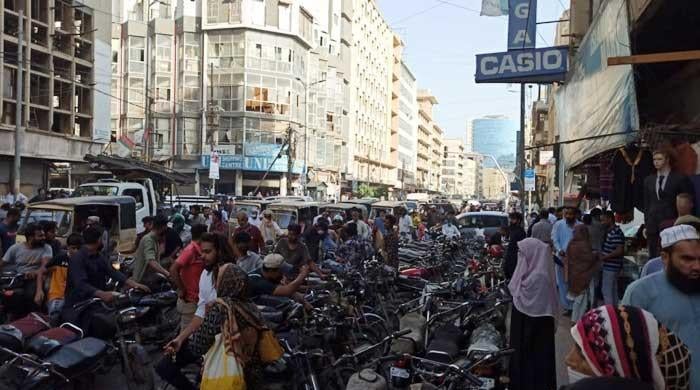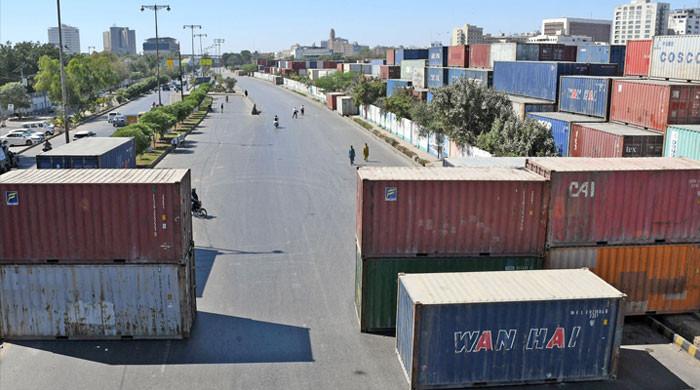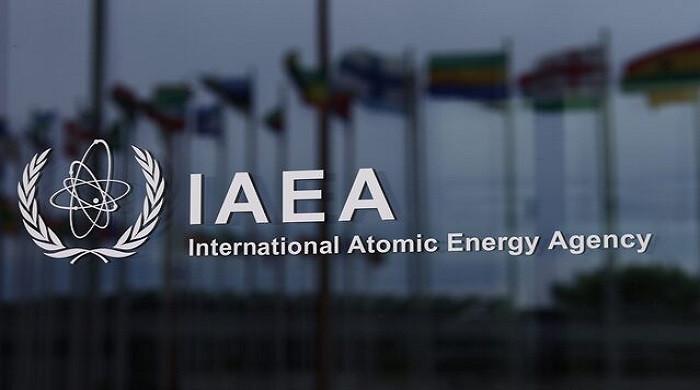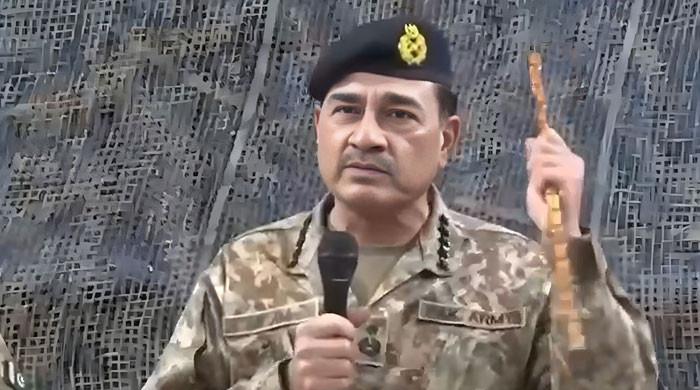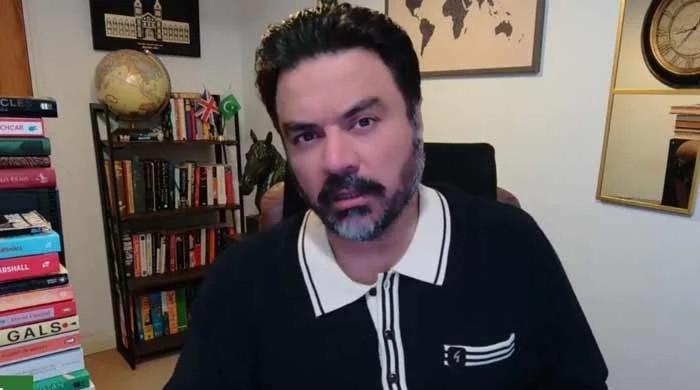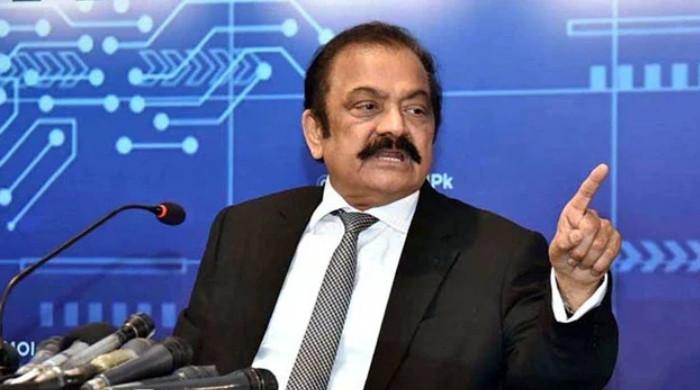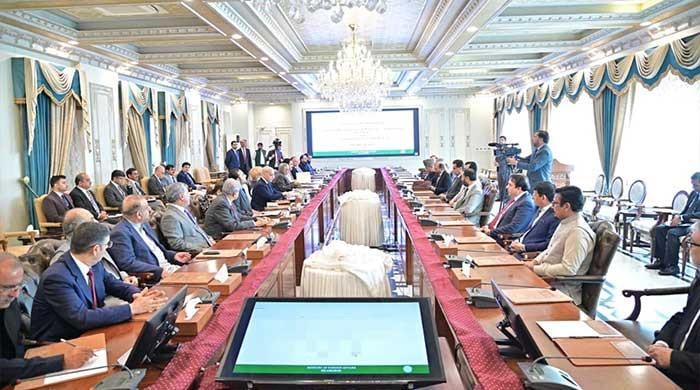I don't know about Shahbaz Gill's tweet regarding PM Office expenditures: Shibli Faraz
Minister says inflation rising because of "COVID-19, treasury's condition, fiscal deficit, and an inefficient system"
February 17, 2021
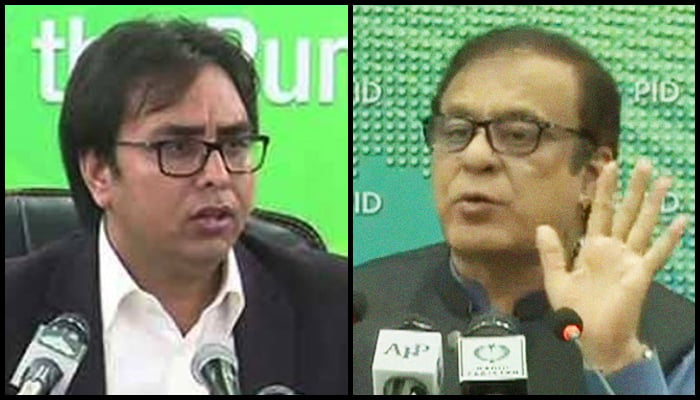
- Shibli Faraz expresses indifference regarding Dr Shahbaz Gill's Twitter post, wherein the latter spoke of the PM Office's rising expenditures
- Says "I do not know about Shahbaz Gill's tweet" and launches into an explanation of the reasons behind Pakistan's inflation figures
- Adds that the reasons for inflation include "COVID-19, the condition of treasury, fiscal deficit, and an inefficient system"
ISLAMABAD: Information and Broadcasting Minister Senator Shibli Faraz once again expressed indifference regarding Dr Shahbaz Gill's Twitter post, wherein Prime Minister Imran Khan's aide on political communications spoke of the PM Office's rising expenditures.
Faraz was speaking to media here in Islamabad when a reporter asked him for a comment on Gill's tweet that indicated that expenditures of the Prime Minister's Office had shot up in 2020 despite being cut down a year earlier.
"Shahbaz Gill tweeted that expenditures of the Prime Minister's Office have increased again. There was a 40% reduction in 2019 but it rose again in 2020," the reporter stated, asking the information minister to comment on it.
"I do not know about Shahbaz Gill's tweet," the minister responded, launching into an explanation of the reasons behind Pakistan's inflation figures.
"There's no doubt that inflation has brought a lot of pain regardless of the reasons [behind it], including COVID-19, the condition of the treasury, fiscal deficit, and an inefficient system," he said, noting that tax collection was "discouraging" but "better than last quarter targets".
He also spoke of the Secretariat employees' protest in Islamabad when authorities fired tear gas at the participants, culminating in the death of a police officer as well. A statement by Interior Minister Sheikh Rasheed Ahmed on the use of tear gas — when he remarked that the lachrymator agent was "tested" on the demonstrators to see if it was still "effective" had also caused an uproar.
Faraz, in his response, explained that although a 25% increase in the government employees' salaries had been approved, there were more structural problems, some of which were due to the "clauses in the 18th Amendment".
"There are differences in the salaries [of employees] in the provincial and federal institutions. To which we say we have to resolve the structural problems.
"There are some clauses in the 18th Amendment... relating to our governance system, the number of employees, and higher provincial [institutions'] salaries," he added.
The minister underlined that due to the differences in pay, employees of the provincial institutions do not wish to be moved or transferred to the federal bodies whereas those working with the Centre were eager to join the provincial ones due to better salaries.
"In this situation, the PTI government is doing whatever it can despite an extreme scarcity of resources. We have given a 25% raise in salaries.
"There's no doubt that there are different reasons behind inflation" but there were differences earlier between the living standards of the common people and their leaders, he said. "That situation has now changed under PM Imran Khan.

"I do not know about this tweet by Shahbaz Gill but that's how the situation is. The prime minister has let go of the royal culture adopted by the PML-N and the PPP," he said, referring to the governments preceding the PTI regime.
"We created the opposite of that system [of the royal culture]. We know that people used to make fun of selling cows and cars but this is symbolic. A leader who shows that they feel the challenges [of common people] is a real leader."
Faraz underlined that PM Imran Khan lived in his own house, as opposed to how, in the past, "families, relatives, and friends lived in the Prime Minister's House under a free-for-all system".
"Everyone was living there luxuriously, with respect to accommodation and food. They had created a mahol [palatial ambience] there. And, now, it's unprecedented how the prime minister doesn't have any camp offices," he added.
According to the federal information minister, expenditures of the Prime Minister's House in 2018 and 2019 were Rs509 million and Rs339 million, respectively. In 2020, however, it came down to Rs280 million. Faraz said the changes from 2018 to 2019 and from 2019 to 2020 reflected decreases of 35% and 49%, respectively.
"In 2020, the expenditures of the PM Office amounted to Rs334 million — almost 29% of saving," he added, noting that in the preceding years 2018 and 2019, the figures were Rs514 million and Rs305 million, respectively.
"There were zero discretionary grants, zero gifts, and zero cash awards," he explained.
With respect to the foreign tours, he said that former prime ministers Yousaf Raza Gilani, Raja Pervaiz Ashraf, Nawaz Sharif, and Shahid Khaqan Abbasi undertook 48 tours costing Rs572 million, nine tours worth Rs107 million, 92 tours worth Rs1,800 million, and 19 tours worth Rs260 million, respectively.
PM Imran Khan, on the other hand, went on 26 foreign tours — "all for the country" — that cost Rs176 million, he added.
Faraz said former president Asif Ali Zardari had two camp offices with an expenditure worth Rs3,600 million, 245 cars, and 656 police officers, while Gilani had five camp offices with an expenditure worth Rs570 million, Nawaz Sharif's Raiwind camp office cost Rs4,300 million and the PML-N supremo had 2,717 cops on his security detail.
Former Punjab chief minister Shehbaz Sharif had two camp offices with an expenditure worth Rs572 million, Shibli detailed.
Read more: Pakistan annual inflation dropped to 5.65% in January
Faraz added that PM Imran Khan, however, had no camp offices. "These expenditures just go on to show that these people considered themselves to be above common people whether with respect to the law or finances.
"[They thought] that there could be strictness and challenges for the nation but there should be no difference in their lives, luxuries, and living standards," he said.
Earlier in the day, Gill, the premier's aide, had shared on Twitter that expenditures of the PM's House were "Rs509 million in 2018, which decreased 35% to Rs339 million in 2019 and 49% to Rs280 million in 2020".
"Prime Minister's Office expenditures were Rs514 million in 2018, which decreased 40% to Rs305 million in 2019 and 29% to Rs334 million in 2020," Gill had added.
It is important to note here that a 35% decrease from Rs509 million is calculated to be Rs330.85 million — not Rs339 million. Similarly, a 49% decrease in either Rs509 million or Rs339 million amounts to Rs259.59 million or Rs172.89 million, respectively — not Rs280 million.
It is also important to note here that a 40% decrease from Rs514 million is calculated to be Rs308.4 million — not Rs305 million. Similarly, a 29% decrease in either Rs514 million or Rs305 million amounts to Rs364.94 million or Rs216.55 million, respectively — not Rs280 million.
Gill also mentioned that the foreign trips of Gilani, Nawaz, Abbasi, and Ashraf were in dollars, while Information Minister Faraz had said they were in rupees.
The aide said Zardari, Nawaz, and PM Imran Khan spent $752,688, $549,853, and $67,180, respectively, on their visits to the US, and $44,000, $58,000, and $9,600, respectively, on their trips to Afghanistan.
Gilani, Nawaz, and the incumbent PM spent $450,000, $761,000, and $52,000, respectively, on the Davos tour, and $288,000, $1,060,000, and $60,000, respectively, to China.
Read more: Almost half of Pakistanis blame federal govt for inflation: survey





